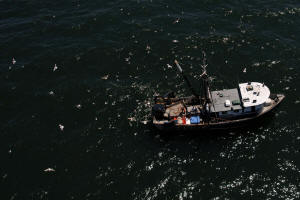U.S. Supreme Court takes up fishermen's fight over US conservation
funding
 Send a link to a friend
Send a link to a friend
 [May 02, 2023]
By John Kruzel [May 02, 2023]
By John Kruzel
WASHINGTON (Reuters) - The U.S. Supreme Court on Monday agreed to decide
whether the government can require commercial fishermen to help fund a
program monitoring herring catches off New England's coast in a case
that could undercut the regulatory power of federal agencies.
The justices took up an appeal by New Jersey-based fishing companies of
a lower court's ruling in favor of the U.S. government in a challenge to
a conservation program overseen by the National Marine Fisheries
Service. The program was begun in 2020 under former President Donald
Trump and is being defended by President Joe Biden's administration.
The case is the latest bid asking the Supreme Court, which has a 6-3
conservative majority, to rein in the authority of federal agencies. The
companies are asking the Supreme Court to overturn its own decades-old
precedent calling for judges to defer to federal agency interpretation
of U.S. laws, a doctrine called "Chevron deference."

The regulations called for certain fishermen to carry aboard their
vessels U.S. government contractors and pay for their at-sea services
while they monitored the catch. The New England herring fishing
regulations were issued by the fisheries service, part of the U.S.
Commerce Department.
Amid concerns about overfishing and fishery management, the program aims
to monitor 50 percent of declared herring fishing trips in the regulated
area, with program costs split between the federal government and the
fishing industry. The monitors assess the amount and type of catch
including species inadvertently caught.

The cost of paying for the monitoring services was an estimated $710 per
day for 19 days a year, which could reduce a vessel's income by up to 20
percent, according to government figures.
The Biden administration said in court papers that the monitoring
program will be suspended for the fishing year starting in April due to
insufficient federal funding.
[to top of second column]
|

Birds fly around a fishing boat in the
waters off Point Judith in Narragansett, Rhode Island, U.S., July 7,
2022. REUTERS/Brian Snyder

The challengers, including lead plaintiff Loper Bright Enterprises,
sued the government in 2020 in federal court, claiming the
requirement that they help pay for monitoring exceeded the agency's
authority under existing law.
The Biden administration, which continued the program, in court
papers has argued that the fisheries service is authorized under a
1976 U.S. law called the Magnuson-Stevens Act to protect against
overfishing in U.S. coastal waters.
The Washington-based U.S. Court of Appeals for the District of
Columbia Circuit last year ruled in favor of the administration,
affirming a federal judge's decision. The D.C. Circuit found that
the regulation was entitled to deference under the 1984 Supreme
Court ruling, Chevron v. Natural Resources Defense Council, that
directed judges to defer to a U.S. agency's interpretation of laws
that may be ambiguous.
Attorneys for the commercial fishermen said the Chevron deference
doctrine "encourages the executive branch's aggrandizement at the
expense of the judiciary, Congress and the citizenry."
The court's conservative majority has signaled skepticism toward
expansive regulatory power in rulings in recent years including one
in 2022 that limited the Environmental Protection Agency's authority
to issue sweeping regulations to reduce carbon emissions from power
plants.
The Supreme Court is due to hear the case in its next term, which
begins in October.
Liberal Justice Ketanji Brown Jackson, who participated in oral
arguments in the case as a lower court judge, took no part in the
consideration of the petition for appeal.
(Reporting by John Kruzel; Editing by Will Dunham)
[© 2023 Thomson Reuters. All rights
reserved.]This material may not be published,
broadcast, rewritten or redistributed.
Thompson Reuters is solely responsible for this content. |